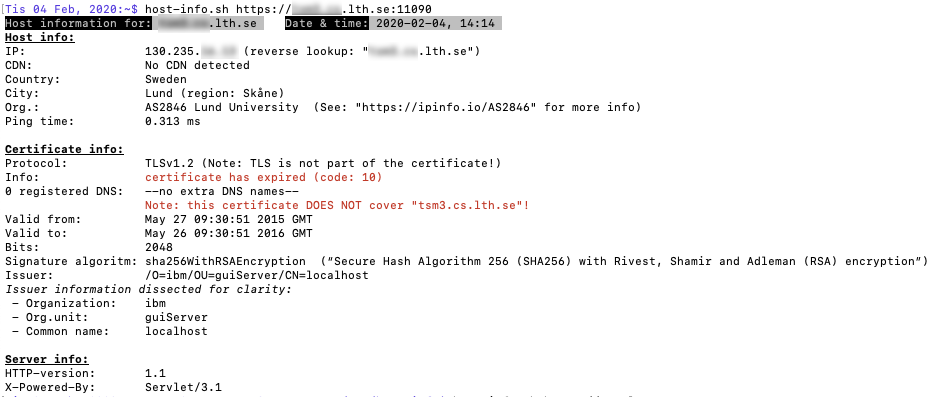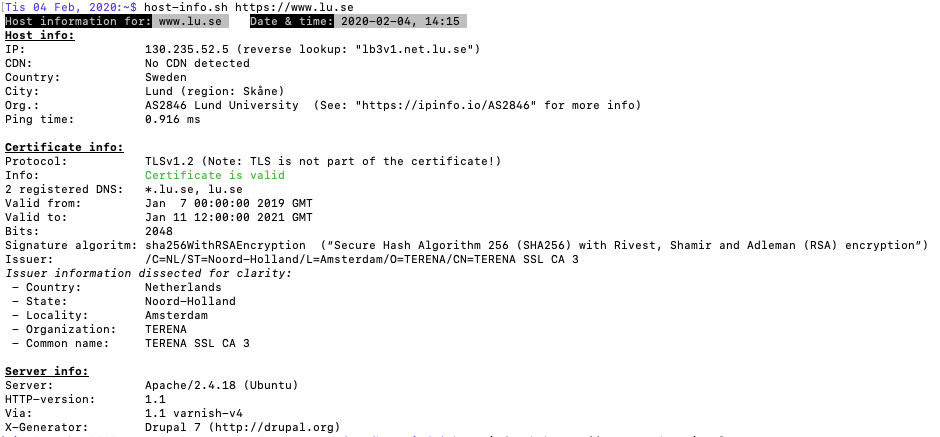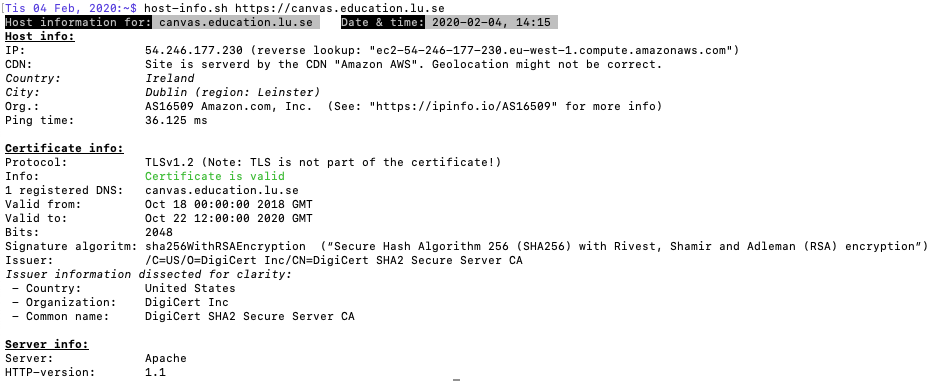A bash-script for macOS, Linux and Windows (with WSL) to get various info about a given machine on the internet:
- Geographic location of the device (country and city)
- IP-address and reverse lookup (i.e. the DNS name that the IP address represents)
- Registrar for the device
- Ping time for the host (lower is better)
The geographic information is retrieved from ipinfo.io.
If the device is given with a http or https address, the following is reported:
- Certificate info:
- If it's valid or not
- What DNS-names the certificate covers
- Valid dates (from- and to)
- What version of TLS (Transport Layer Security) is used
- Who has issued the certificate
- Server info (not all servers use all fields):
- HTTP-version
- What sever (
apache,nginxetc.) - “Via”, i.e. if a cache has been used
- “X-Generator”, i.e. CMS or such, for example “Drupal”
- “X-Powered-By”, i.e.
PHPor specialized servers
The certificate information is retrieved using openssl and the server info comes from the HTTP header and is retrieved with curl --head.
You must have curl and dig on your system.
In order for the certificate check to work, you must have a fairly modern version of openssl. This excludes OS X / macOS up until version 10.12.
You will get the most out of it with a URL. Simply copy it from a web browser and paste in the terminal!
You may however also enter just a DNS-name or an IP-address.
- URL:
host-info.sh https://dns.name:port/path - DNS-name:
host-info.sh dns.name - IP-address:
host-info.sh ip.number.xx.yy
Since most synchronization software (DropBox, OneDrive, Google Drive, iCloud etc.) uses https as transport mechanism, one can get the servers used through either netstat or lsof:
- macOS:
netstat -an -f inet | grep "ESTABLISHED" | awk '{print $5}' | sort -u | sed -e 's/\./ /4'lsof +c 0 -i 4 -n | grep "ESTABLISHED" | sort -f -k 1,1 | cut -d\( -f1 | awk '{ print $1" "$3" "$9 }' | sed 's/\ [[:digit:]].*-\>/\ /g' | sed 's/:/\ /g' | sort -f | uniq -c
- Linux:
netstat -an | grep "ESTABLISHED" | egrep -v "127.0.0.1|::" | awk '{print $5}' | sort -u | sed -e 's/:/ /'lsof +c 0 -i 4 -n | grep "ESTABLISHED" | sort -f -k 1,1 | cut -d\( -f1 | awk '{ print $1" "$3" "$9 }' | sed 's/\ [[:digit:]].*->/\ /g' | sed 's/:/\ /g' | sort -f | uniq -c
(Note that the lsof output above will also output number of connections, running application and running user. Also note that with lsof you must be running as root in order to see processes other than your own.)
You can use this to find where your various cloud storage is located. Use the lsof string above and look for connections to couldd, Box Sync, Backup and Sync (Google), Dropbox or OneDrive! There you will get a number of IP-addresses and protocol (hint: they all use https) and you can look them up and know for yourself where they are!


